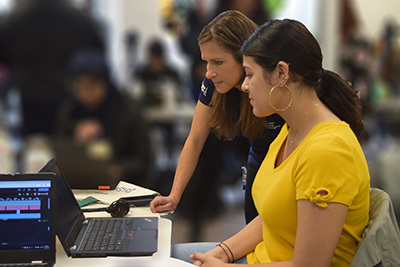
Collaborative Research Broadening Participation of LatinX Students in Computer Science by Integrating Culturally Relevant Computational Music Practices (REMEZCLA)
The Georgia Institute of Technology and the University of Puerto Rico-Rio Piedras received a $2.9 million grant from the National Science Foundation (NSF), Advancing Informal STEM Learning (AISL) program. The grant collaboration began on July 1, 2020 and will continue through June 30, 2024.
The Collaborative Research Broadening Participation of LatinX Students in Computer Science by Integrating Culturally Relevant Computational Music Practices, called "REMEZCLA" by project members, will directly address the lack of representation of LatinX and Spanish-speaking students in computer science. This NSF-funded project will expand middle and high school students' STEM engagement and opportunities within both the continental United States and Puerto Rico. The creative approach will teach code and music composition by designing, implementing, and assessing a new informal learning curriculum.
Diley Hernandez from Georgia Tech and Rafael Arce-Nazario from the University of Puerto Rico-Rio Piedras will serve as the project's principal investigators. They will work alongside Georgia Tech co-principal investigators Douglas Edwards and Jason Freeman, and co-principal investigator Joseph E. Carroll Miranda from the University of Puerto Rico-Rio Piedras. "For years, Georgia Tech has made significant efforts to improve access and STEM preparation for Georgia Latinx students through the GoSTEM program,” said Hernandez, a senior research scientist with the Center for Education Integrating Science, Mathematics, and Computing (CEISMC). “With REMEZCLA, we can capitalize on these years of experience and design a product for Latinx students that can expand across the United States and beyond. We will be creating a curriculum designed with them in mind that embraces the messy and unique complexity of our cultures. Students will be able to bring those assets and celebrate who they are in the process of musical creation through coding.”
This inclusive computer science curriculum will encourage students to establish connections to their own cultures, communities, and lived experiences. The lessons use culturally relevant pedagogical practices that allow students meaningful engagement while acquiring computational thinking skills. “The word remezcla, the Spanish term for “remix”, refers to the combination and mixing of cultural forms and artifacts like music into something different, new and unique. This is a process that lies at the core of Latin culture both musically and culturally. So, musical remixing is not merely an inter-disciplinary art form that allows people to be creative, but also a culturally authentic way to engage students in learning” shared Hernandez.
“Diversity and inclusion thrive through REMEZCLA by allowing LatinX students to engage in STEM by using culturally relevant musical expressions that introduce young minds to computer science curriculum and careers,” said Archie Ervin, vice president of Institute Diversity, Equity, and Inclusion. “This is reflective of the wonderfully innovative and collaborative spirit that characterizes Georgia Tech.”
"Researchers will use a mixed-method design for data collection that includes surveys, interviews, focus groups, and computational products created by students," said Edwards, a CEISMC senior research associate. "Components implemented in the program in both Atlanta and Puerto Rico will study the impact on students' computational skills, content knowledge, and other psycho-social factors like computer science identity. The results will inform the future of culturally relevant computer science education programs for Latinx and Spanish speaking youth."
Another significant aspect of this project will be the adaptation of the Georgia Tech-developed music platform, EarSketch, making it culturally and linguistically accessible to Latinx students.
The redesign of the EarSketch music platform will include the ability to switch between Spanish and English easily. The platform will incorporate new beats and sounds representative of traditional and contemporary Latin musical genres. This way, students will learn how to code and reprogram music using a culturally inclusive technology and create musical compositions connected to stories of their community and heritage.
Freeman, chair of the Georgia Tech School of Music and co-creator of EarSketch, said his team would collaborate with diverse cultural groups to ensure the curricular content is valid and culturally equivalent across Latinx students and sites. "The informal learning program will be implemented as a semester-long afterschool program in six schools per year, in Atlanta and Puerto Rico, and twice during the summer as a one-week summer camp," said Freeman.
"The vast majority of Puerto Rico's public schools do not have computer science classes. This project fits perfectly into our University's ongoing efforts to insert computational thinking into K-12, especially since it highlights its creative aspect.” said Arce-Nazario, “I am excited that musical expression will be the vehicle for middle and high-school students to learn the fun and useful skills of computational thinking."
"It is exciting to examine the impact of culturally authentic tools and practice to increase Latinx students' interest and achievement in coding through music," said CEISMC executive director, Lizanne DeStefano. "We cannot wait to see what the students produce!"
###
National Science Foundation (NSF) Award # 2005791 - “Collaborative Research Broadening Participation of Latinx Students in Computer Science by Integrating Culturally Relevant Computational Music Practices”
NSF Project Abstract:
Computing and computational thinking are integral to the practice of modern science, technology, engineering, and math (STEM); therefore, computational skills are essential for students? preparation to participate in computationally intensive STEM fields and the emerging workforce. In the U.S., Latinx and Spanish speaking students are underrepresented in computing and STEM fields, therefore, expanding opportunities for students to learn computing is an urgent need. The Georgia Institute of Technology and the University of Puerto Rico will collaborate on research and development that will provide Latinx and Spanish speaking students in the continental U.S. and Puerto Rico, opportunities to learn computer science and its application in solving problems in STEM fields. The project will use a creative approach to teaching computer science by engaging Latinx and Spanish speaking students in learning how to code and reprogram in a music platform, EarSketch. The culturally relevant educational practices of the curriculum, as a model for informal STEM learning, will enable students to code and reprogram music, including sounds relevant to their own cultures, community narratives, and cultural storytelling. Research results will inform education programs seeking to design culturally authentic activities for diverse populations as a means to broaden participation in integrated STEM and Computing. This Broad Implementation project is funded by the Advancing Informal STEM Learning (AISL) program, which seeks to advance new approaches to, and evidence-based understanding of, the design and development of STEM learning in informal environments, including multiple pathways for broadening access to and engagement in STEM learning, advancing innovative research on and assessment of STEM learning in informal environments and developing understandings of deeper learning by participants.
As part of the technical innovation of the project, the EarSketch platform will be redesigned for cultural and linguistic authenticity that will include incorporating traditional and contemporary Latin sound beats and musical samples into the software so that students can remix music and learn coding using sounds relevant to their cultures; and developing a Spanish version of the platform, with a toggle to easily switch between English and Spanish. Investigators will also develop an informal STEM curriculum using best practices from Culturally Relevant Education and Cultural Sustaining Pedagogy that provides authentic, culturally, and linguistically rich opportunities for student engagement by establishing direct and constant connections to their cultures, communities and lived experiences. The curriculum design and implementation team will work collaboratively with members of Latinx diverse cultural groups to ensure semantic and content equivalency across diverse students and sites. Validating the intervention across students and sites is one of the goals of the project. The model curriculum for informal learning will be implemented as a semester-long afterschool program in six schools per year in Atlanta and Puerto Rico, and as a one-week summer camp twice in the summer. The curricular materials will be broadly disseminated, and training will be provided to informal learning practitioners as part of the project. The research will explore differences in musical and computational engagement; the interconnection between music and the computational aspects of EarSketch; and the degree to which the program promotes cultural engagement among culturally and linguistically heterogeneous groups of Latinx students in Atlanta, and more culturally and linguistically homogenous Latinx students in Puerto Rico. Investigators will use a mixed-method design to collect data from surveys, interviews, focus groups, and computational/musical artifacts created by students. The study will employ multiple case study methodology to analyze and compare the implementation of the critical components of the program in Puerto Rico and Atlanta, and to explore differences in students? musical and computational thinking practices in the two regions. Results from the research will determine the impact of the curriculum on computer science skills and associated computational practices; and contribute to the understanding of the role of cultural engagement on educational outcomes such as sense of belonging, persistence, computational thinking, programming content knowledge, and computer science identity. Results will inform education programs designing culturally authentic and engaging programming for diverse populations of Latinx youths.
This award reflects NSF's statutory mission and has been deemed worthy of support through evaluation using the Foundation's intellectual merit and broader impacts review criteria.


